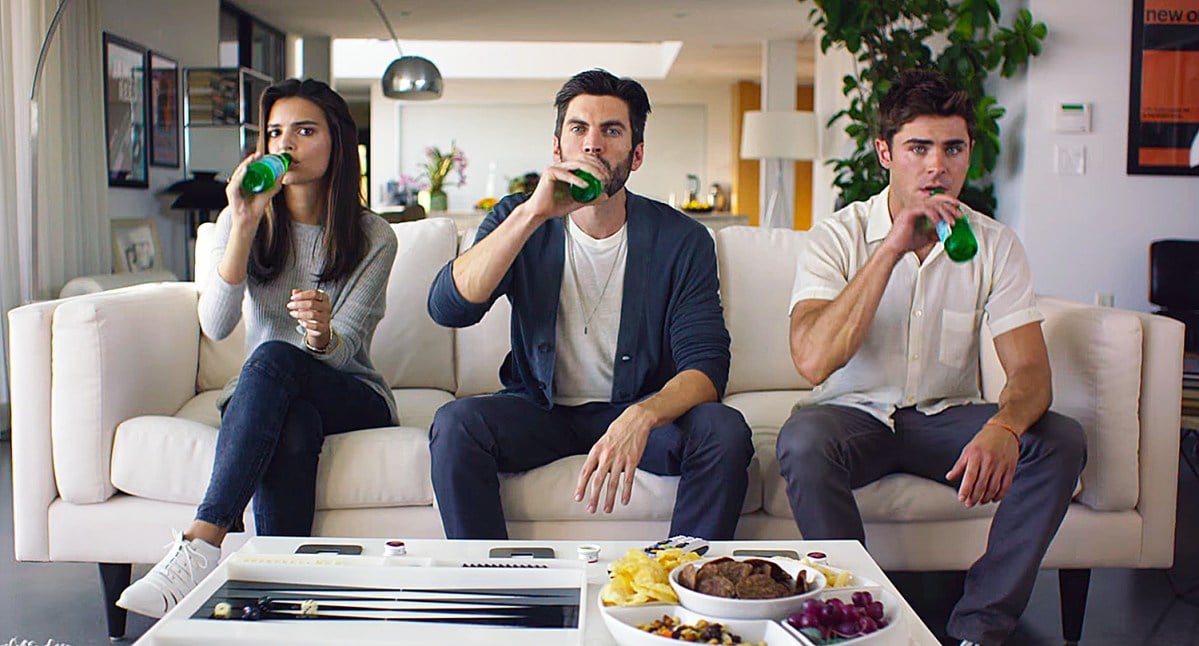We Are Your Friends picked an unfortunate time to hit theaters, because anyone who has seen Straight Outta Compton (or even just the trailers) will probably find We Are Your Friends to be laughable in its attempt to show “the other side of the track.” The film plays like a joke about kids who see themselves as disenfranchised youths but fails to acknowledge the privilege they actually do enjoy. It’s the story of a couple of 23-year-old guys who talk about living on the outskirts (in that hard knock city of the San Fernando Valley), but still live at home and can complain about not having enough money from apparently working one day a week, as well as about working on the house with their father.
Cole (Zac Efron) wants nothing more than to be a DJ but can’t seem to understand that artistic pursuits sometimes come with financial sacrifice and/or working a day job before making it. He and his friends see having a day job like selling out, but they’re quick to take an easy job that’s clearly a profession Jordan Belfort or Gordon Gecko would have approved of (from the first minute Jon Bernthal appears on screen, you know what he’s about). While being shocked that a gig that pays under the table might be corrupt, Cole “befriends” James (Wes Bentley) and his girlfriend Sophie (Emily Ratajkowski), two more over-privileged and unlikable people.
And unlikable is the key word for this movie, because these characters really are hard to like, but I don’t think that was the intention of the film. Cole, Sophie, James, and Cole’s friends are all people you wouldn’t want to spend a night at a party and clearly see themselves as more authentic than the rest of the people they have to deal with. In fact, the only person who occasionally earns symphony (not often) is Alex Shaffer’s Squirrel.
On top of that, none of these characters seem like they’re actually friends. In fact, Cole and his friends lack any friends’ chemistry, so what should play as friendly jokes seem mean-spirited, and the big emotional moments feel completely overplayed. Chemistry-wise, Ratajkowski and Efron have none and usually look like two actors hired for a day on a music video rather than romantic leads. The only person Efron does have chemistry with is possibly Bentley, who’s arguably the only person really putting in a lot of effort—sometimes, too much. There was a lot of laughing during the screening that didn’t seem intentional on the film’s part.
There was a point when I realized I didn’t know most of the character’s names, and that fact didn’t bother me. It did frustrate me, because I didn’t care what happened to any of these people, but I could predict all of it. There’s no sense of intimacy in what should be a character-driven, coming-of-age film, Cole’s ambition (to be a DJ) seems petty, and the screenwriters never sold that this was a worthy pursuit. I’m sure it ‘s hard, and I might even be interested in a documentary about it, but watching Efron and Bentley talk and stress about it is pretty boring stuff.
Catfish director Max Joseph makes his narrative debut in this film, which he cowrote with Meaghan Oppenheimer, and goes overboard throwing in visual and auditory flourishes that alienate the audience rather than bring them in. Cole’s narration is grating, especially when he’s talking about being a DJ, and the visual embellishments feel like they’re trying to fill in gaps,aAs do the multitude of full-song montages in the film, which look like decade-old music videos. I counted 6, but there could have been more.
It’s clear to me that this movie borrows its structure from some of the ’70s coming-of-age, delayed-adolescence movies we still love, like Saturday Night Fever and Breaking Away. But what those movies had was a sense that there is any personal connection to this specific story, which this movie completely lacks. There ‘s nothing that feels authentic or earnest, especially the relationships. It feels entirely manufactured as an opportunity to cash in and nothing to do with having a story that had to be told. Oddly, the film’s view (presented with some extremely shallow dialogue) that you can tell when art comes from an organic, honest place is good advice—advice I wish the filmmakers had actually taken to heart.
Lesley Coffin is a New York transplant from the midwest. She is the New York-based writer/podcast editor for Filmoria and film contributor at The Interrobang. When not doing that, she’s writing books on classic Hollywood, including Lew Ayres: Hollywood’s Conscientious Objector and her new book Hitchcock’s Stars: Alfred Hitchcock and the Hollywood Studio System.
—Please make note of The Mary Sue’s general comment policy.—
Do you follow The Mary Sue on Twitter, Facebook, Tumblr, Pinterest, & Google +?









Published: Aug 28, 2015 03:36 pm